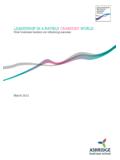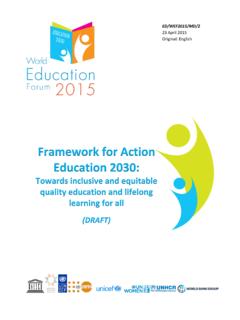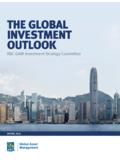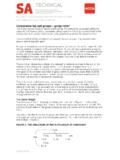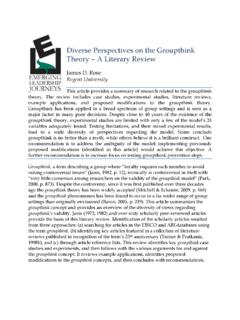Transcription of The State of CSR and RME in Business Schools and …
1 Prof Debbie Haski-Leventhal and Julian Concato Macquarie Graduate school of Management, Australia The State of CSR and RME in Business Schools and the attitudes of their Students Third bi-annual study, 2016 Table of Contents Prof Debbie Haski-Leventhal and Julian Concato 1 ..Ta b l e o f C o n t e n t s 2 ..Preface 3 Executive Summary 4 ..Key Findings 5 ..Introduction 6 ..Literature Review 7 ..The Evolution of CSR and the Emergence of RME 7 ..Importance of CSR and RME in Business Schools 9 ..Strengthening CSR and RME in Business school Curriculums 10 ..Methodology 13 ..Procedure 13 ..Instrument 13 ..General Sample 13 ..Results 15 Awareness of the UN Global Compact, PRME and UN Sustainable Development Goals 15 ..Activism in the Community 16 ..Personal sustainability behaviour, values and attitudes 17 ..Perception of RME 20 ..Ranking of Business responsibilities 26 ..CSR attitudes and employment aspirations 27.
2 Discussion 31 Implications for Business education and management 33 ..Conclusion 35 References 36 2 Preface I am delighted to share with you the results of the third annual report on the international Business student study led by the Principles of Responsible Management Education (PRME) Secretariat and PRME Signatory Macquarie Graduate school of Management (MGSM) with the support of an advisory committee composed of additional PRME signatory Schools (Bentley University, IAE, China Europe International Business school , Kedge Business school [formerly Euromed Management] and Aston Business school ). The aim of this ongoing study is to examine responsible management and CSR attitudes among Business and management students around the world. The first two surveys were conducted in 2011 and 2013. The third survey demonstrates a trend of growing interest among students in responsible management education and working for responsible companies.
3 The third round included, for the first time, both undergraduate and postgraduate students, and both signal very clearly their expectations from Business Schools and future employers. I would like to thank Jonas Haertle and the PRME Secretariat at the Global Compact office for their enthusiastic support and their tremendous help; the advisory committee; the signatory Business Schools who participated in the study and the students who responded to the survey. Associate Professor Debbie Haski-Leventhal, MGSM, Australia The results of this report are very encouraging. They indicate that the students in PRME signatory Schools have positive attitudes towards responsible management, and would like their Schools to further introduce them to responsible management education (RME). The data collected by Dr Debbie Haski-Leventhal provide evidence supporting what PRME has been working towards since the day it was established: that students, as well as other stakeholders, demonstrate social responsibility.
4 It is our role, for PRME as an initiative and as education institutions, to meet their expectations. I would like to thank the PRME signatory Schools that participated in this study as well as members of the PRME Advisory Committee. Without them and their students, this study would not have been possible. I would like to take this opportunity to further encourage all signatory Business Schools to participate in the MGSM-PRME survey in the future, so we can gain a broader view on the perspectives of students from around the world. Jonas Haertle, Head, PRME Secretariat 3 Executive Summary The purpose of this report is to present the findings of the third MGSM-PRME survey, conducted between October 2015 and November 2016. The goal of the study is to examine students attitudes towards corporate social responsibility ( CSR ) and responsible management education ( RME ) as well as the difference between students according to other variables such as age, program, study stage and more.
5 The survey attracted respondents from UN Principles for Responsible Management Education ( PRME ) signatory Schools around the world and follows on from previous studies completed in 2011 (Haski-Leventhal, 2012) and 2013 (Haski-Leventhal, 2013). This survey and research was carried out by Macquarie Graduate school of Management ( MGSM ) in Australia (whom is PRME signatory), the PRME Secretariat and with the assistance various PRME signatory Schools who circulated the survey. For the first time the survey included respondents currently undertaking undergraduate studies and new questions, such as on the Sustainable Development Goals and future employment. A total of 1,699 respondents contributed by responding to an online survey. The responses were than analysed from both a qualitative and quantitative perspective to extrapolate a meaningful data set to allow the examination of the responses attained.
6 The respondents demonstrated sound understanding of CSR and responsible management concepts. Though their personal contribution to the community via volunteering, donations and participating in social movements was underwhelming, in a professional sense as our future Business leaders they appeared well prepared and have a sound focus on CSR. Students exhibited positive CSR attitudes , with a heightened focus on acting ethically and a diminished focus on financial considerations. The survey showed students felt comfortable utilising their RME and though the respondents felt academic institutions were doing a satisfactory job of promoting RME, there was room and need for further improvement. The respondents have provided an acute insight into the students views on CSR and RME, and have revealed some key areas in need of consideration within academic institution.
7 4 Key Findings 5 Community activism was underwhelming. Two in three of respondents did not undertaken any volunteering activities, on in three of respondents made no donations and just over three quarters of respondents participated in no social movements. Living a happy, comfortable life was rated as absolutely essentials or very important by 90% of respondents, whilst only 50% respondents felt making a lot of money was absolutely essentials or very important. Interestingly 21% of respondents rated living according to your religious faith not at all important. The survey results showed a decrease in awareness of the UN Global Compact to 24% of respondent, down from 33% in 2013 and 25% in 2011. 26% of respondents were able to confirm their academic institution was a member of the PRME, down from 37% in 2013. 37% of respondents had also heard of the UN SDGs.
8 Respondents highlighted the importance of the role managers play in the decision making process and the responsibilities they have to all stakeholder including the environmental and society. 40% of respondents felt their Schools meet their RME expectations to a high degree or better, while 38% felt they were either well equipped or very well equipped to apply their CSR knowledge in real life. The survey showed that adding additional topics and content to Business programs, utilised real life case studies and industry experts to explore the topics and, providing more encouragement to undertake further study in this area were the main means of increasing RME. The respondents did not rank Business responsibilities in line with Carrol s Pyramid (Carroll, 1991), rather ethics was ranked as the most important responsibility. Half of the respondents would give-up more than 20% of their initial financial benefit to work for a company that cares about employees.
9 One in five students would scarify 40% or more (!) of their future salary to work for a company that demonstrates several aspects of CSR. Introduction As Millennials enter the workforce and find their way into senior management we witness an increased appreciation for the importance CSR and responsible management play, not only in operating reputable and profitable Business , but also in addressing the social, political and environmental challenges faced around the world (Robins, 2015). It is these same individuals, in a personal context, which have pushed for increased scrutiny surrounding corporations, the social responsibility they bear and the role Business leader s play in implementing CSR strategies. It was coinciding with this movement that the UN launched the Global Compact in 2000, an agency aimed at aligning strategies and operations with universal principles on human rights, labour, environment and anti-corruption, and take actions that advance societal goals (Global Compact, 2016).
10 Notwithstanding this encouraging shift in societal perception there is still question as to the adequacy of the education and training tertiary academic institutions provide our future Business leaders, particularly in dealing with the ethical and social responsibility they will bear. These academic institutions play a vital function in providing RME but also shaping the perception of these crucial concepts in the greater community. In an effort to transform management education, research and thought leadership globally, PRME was launched in 2007 in Geneva (PRME, 2016). In the years that have followed, PRME has helped elevate an awareness as to the important of CSR and RME within the tertiary academic institutions which educate our future Business leaders. Strengthening the focus on CSR and RME within tertiary curriculums and the manner in which that knowledge is delivered is imperative in the preparation of our future leaders particularly through MBA programs.
